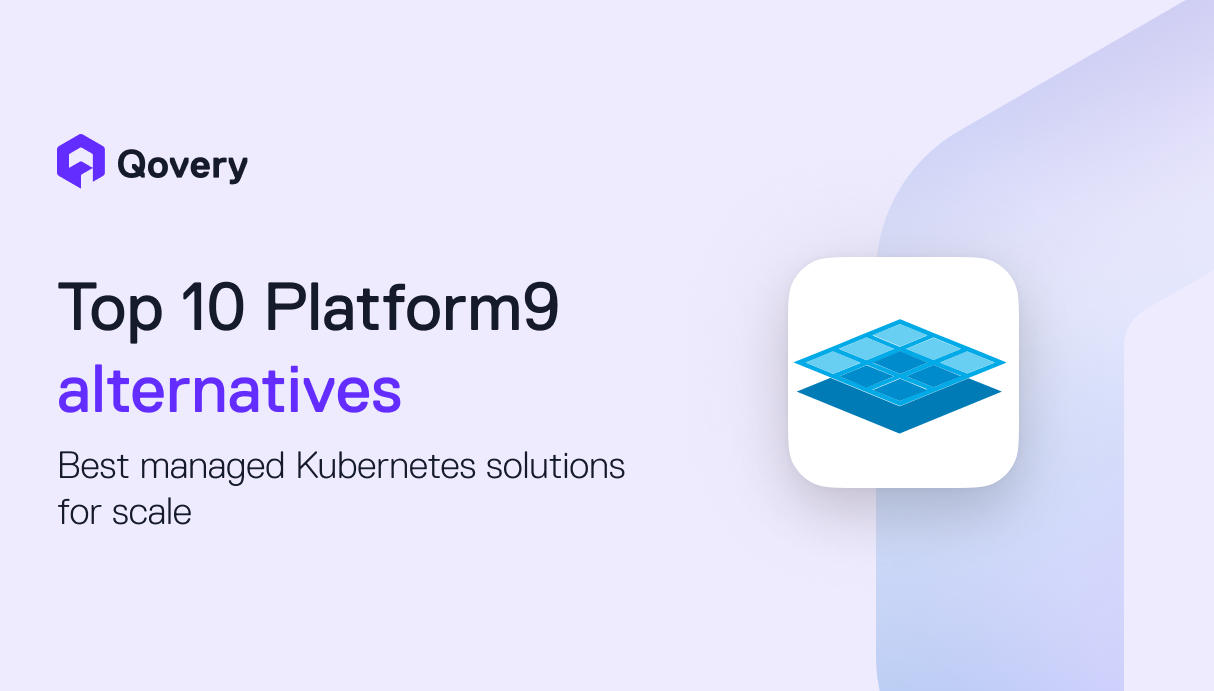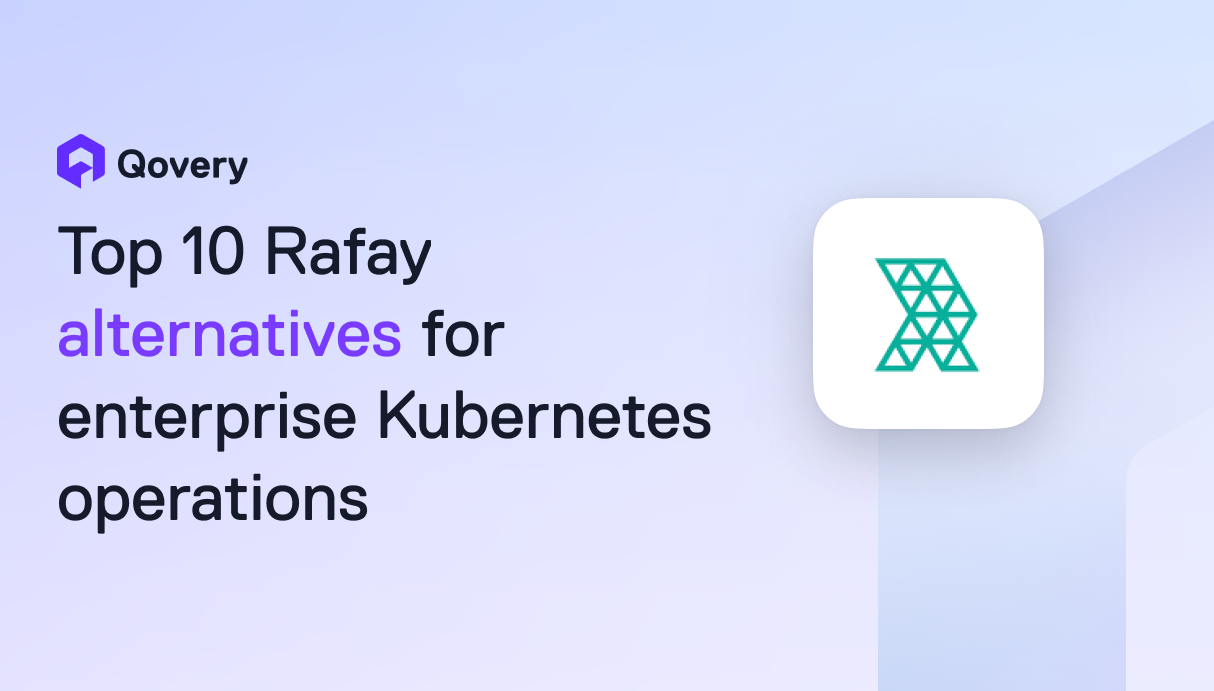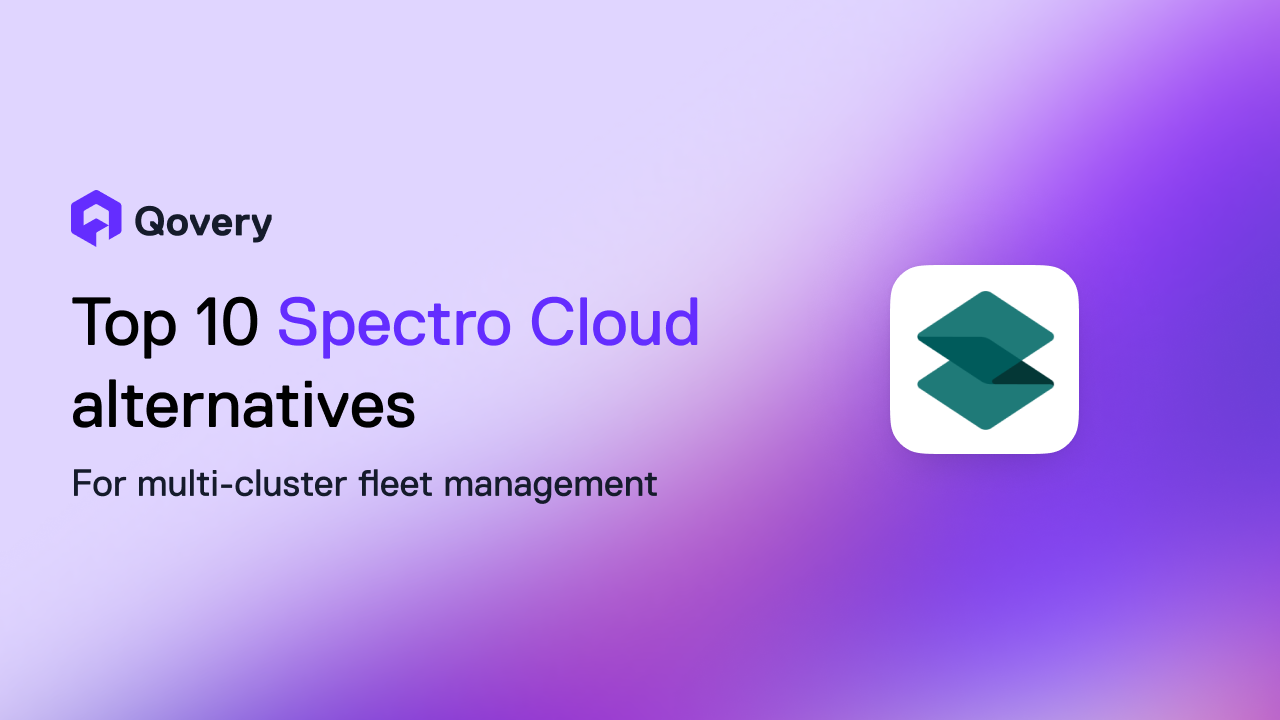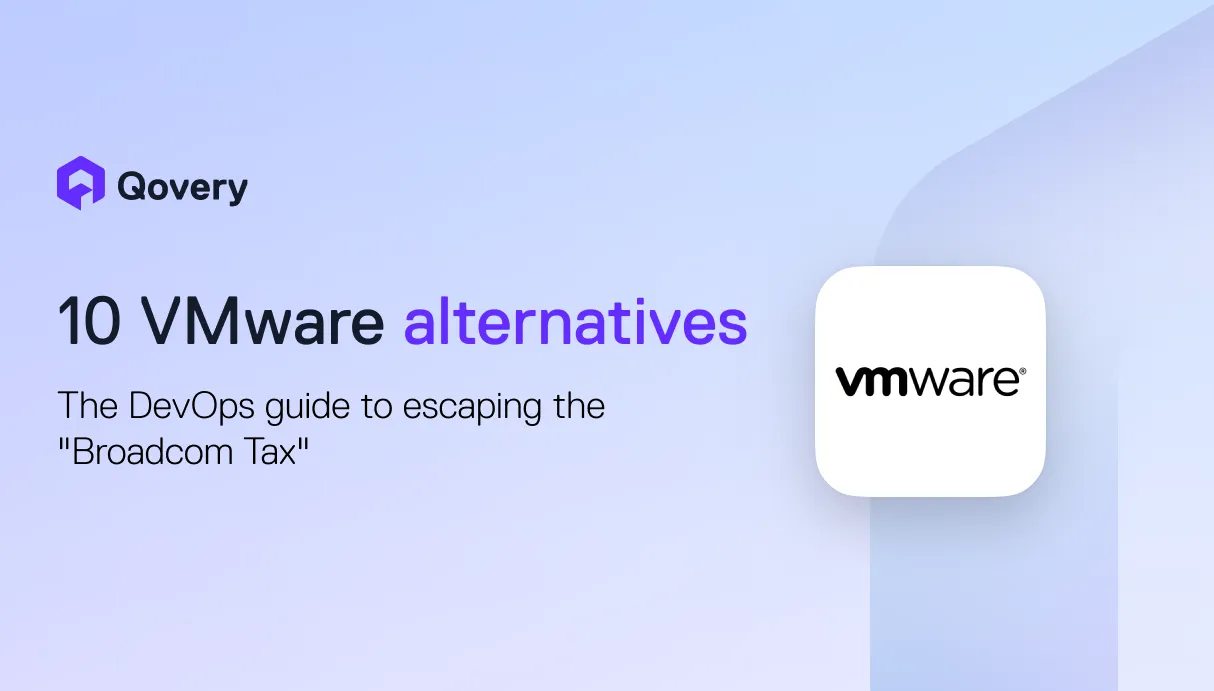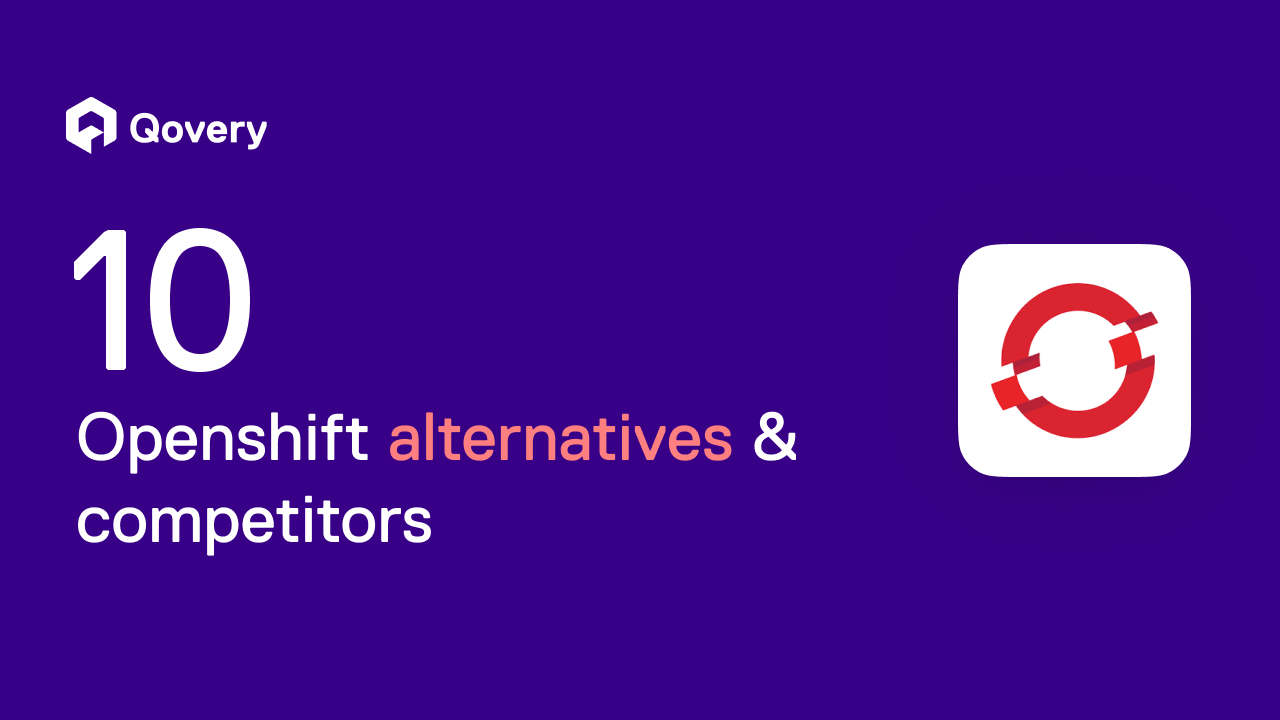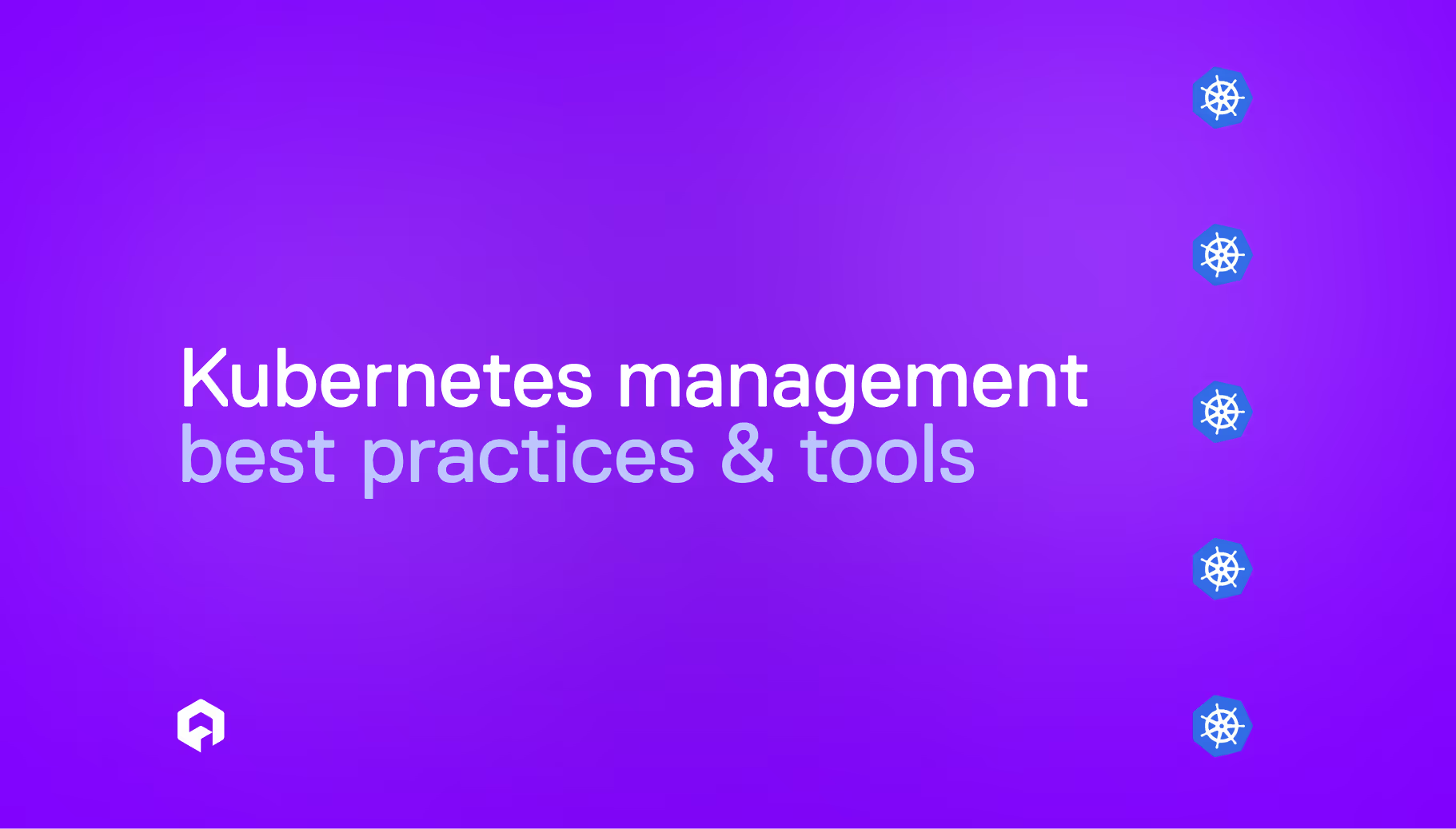

Self-Hosted vs. Fully Managed Hosting Platforms: What to Choose for Mid-Size Teams?



Key Points:
- Self-hosting offers maximum control and cost efficiency, but requires significant expertise and resources. This approach gives you complete customization and the ability to optimize infrastructure costs as you scale. However, it comes with a high burden of responsibility, requiring a specialized team for ongoing maintenance, security, and scalability, which can divert resources from core product development.
- Fully managed hosting reduces operational overhead and speeds up time to market. By outsourcing infrastructure management to a third-party, teams can focus entirely on product development. These platforms offer built-in expertise, automated scaling, and faster deployments, but at the cost of less customization, potential vendor lock-in, and higher upfront expenses compared to a raw infrastructure purchase.
- The choice between the two depends on a team's budget, technical expertise, and scaling needs. The article concludes that for most mid-size, growing companies, a fully managed platform is the more strategic choice. It provides a better balance of capabilities and cost-effectiveness by freeing up resources to focus on innovation and faster delivery, which are critical for staying competitive.
When a product initially reaches its intended market, the choice of how to host applications and services comes quickly to build a sustainable foundation for a company to grow. For mid-size organizations, the choice usually revolves around self-hosting or using a fully managed platform.
These organizations face the challenge of balancing control, cost, and operational complexity while maintaining rapid development cycles to deliver products and updates. Choosing the right strategy for infrastructure hosting can impact product delivery and company velocity for years.
Given this strategic importance, this guide explores both hosting models, comparing benefits, tradeoffs, and key considerations.
What Is Self-Hosting?
Self-hosting refers to infrastructure managed end-to-end by the engineering organizations. This approach implies setting up, configuring, and managing your servers, typically relying on public cloud platforms like AWS or GCP.
In self-hosted environments, your team is responsible for every aspect of the infrastructure stack, from managing operating system updates to security patches and backups. While hardware management is often handed off to providers, the management and maintenance of servers remain with the organization.
Advantages of Self-Hosting
1. Complete control and Customization
Self-hosted environments offer great flexibility to engineering organizations on how to manage and deploy their applications to the cloud. Every aspect of the infrastructure, from server profiles to networking configurations, can be tailored to the exact needs of an application. This helps organizations build a better-fitting environment to respond to the needs of their customers and internal team, allowing for an ideal product development and delivery experience.
2. Cost Efficiency
When benefiting from tailored infrastructure and scalability on demand, engineering teams can optimize the server profiles and scale to the exact needs of the application. This ability to predict workload and provision accordingly can generate significant cost savings. Interacting directly with infrastructure providers can yield further savings when scaling an application and allocating larger resources.
Disadvantages of Self-Hosting
1. Technical Expertise Requirement
Managing infrastructure requires deep technical knowledge across multiple domains like networking, backup management, security, and server administration. This expertise requires a specialized team of operational engineers to deploy, configure, and maintain all deployments and configurations.
2. Maintenance burden
Once infrastructure has been set up and applications are running, the job continues for teams to maintain and update the existing configurations. Security updates, backup management, and other troubleshooting are continuous work with maintaining the infrastructure. This involves a significant time investment that can otherwise be used for product development.
3. Operational Responsibility
While cloud providers are often responsible for low-level issues, infrastructure teams need to implement constant monitoring over servers, which implies another time investment for setting up proper monitoring as well as on-call procedures for engineers to intervene when needed.
4. Scalability Challenges
When implementing an in-house solution for hosting applications, scaling typically comes as an afterthought. Careful planning and expertise are required to implement scaling and fault-tolerant workloads to follow the growth of a product. This challenge requires dedicated resources and time investment to manage effectively.
What is Fully Managed Hosting?
Fully managed hosting is the other end of the spectrum of hosting solutions for engineering organizations. Here, the deployment and management of infrastructure is handled by a third party, which handles provisioning and continuous maintenance of underlying servers.
Relying on fully managed hosting frees the team to exclusively focus on their application development while the infrastructure is handed off to service providers. Modern fully managed platforms often offer services that go beyond infrastructure management, like deployment management, database hosting, monitoring, and scaling.
Advantages of Fully Managed Hosting
1. Reduced Operational Overhead
The biggest selling point for fully managed hosting is the time saved by letting platforms manage infrastructure. With these tasks being offloaded to the third-party service, teams can focus entirely on product development rather than managing infrastructure.
2. Built-in expertise
Managed platforms offer out-of-the-box best practices in terms of security, performance optimization, and reliability. This prevents your teams from needing to learn deep infrastructure knowledge to deploy and run applications for customers, as they’re relying on the provider's expertise.
3, Scaling ease
Most fully managed hosting platforms include auto-scaling capabilities to adjust resources based on demand. This ensures optimal application performance during traffic spikes and minimizes costs during a lower usage period.
4. Faster Time to Market
By eliminating infrastructure setup and management tasks, a fully managed platform significantly reduces the required time to launch a new application or new features. This acceleration is a crucial competitive advantage for teams wanting to increase their delivery performance.
Disadvantages of Fully Managed Hosting
1. Limited Customization
Managed platforms often come with strong constraints on how to configure the underlying infrastructure. These constraints, existing to ensure the quality of service and simpler setup, can conflict with the ideal requirements companies may have regarding their applications.
2. Vendor lock-in concerns
Migration away from a managed platform can be challenging. Deployment configurations are usually platform-specific and sometimes not exportable to other solutions. With deep ties to a single offering, the ability to change providers can be limited.
3. Higher costs
The main tradeoffs to using fully managed hosting are the added costs compared to bare-bone infrastructure provisioning. The service offered by these platforms incurs significant costs, which, on paper, are a bigger monetary investment than a raw infrastructure purchase.
Comparison Table: Self-Hosted vs. Fully Managed
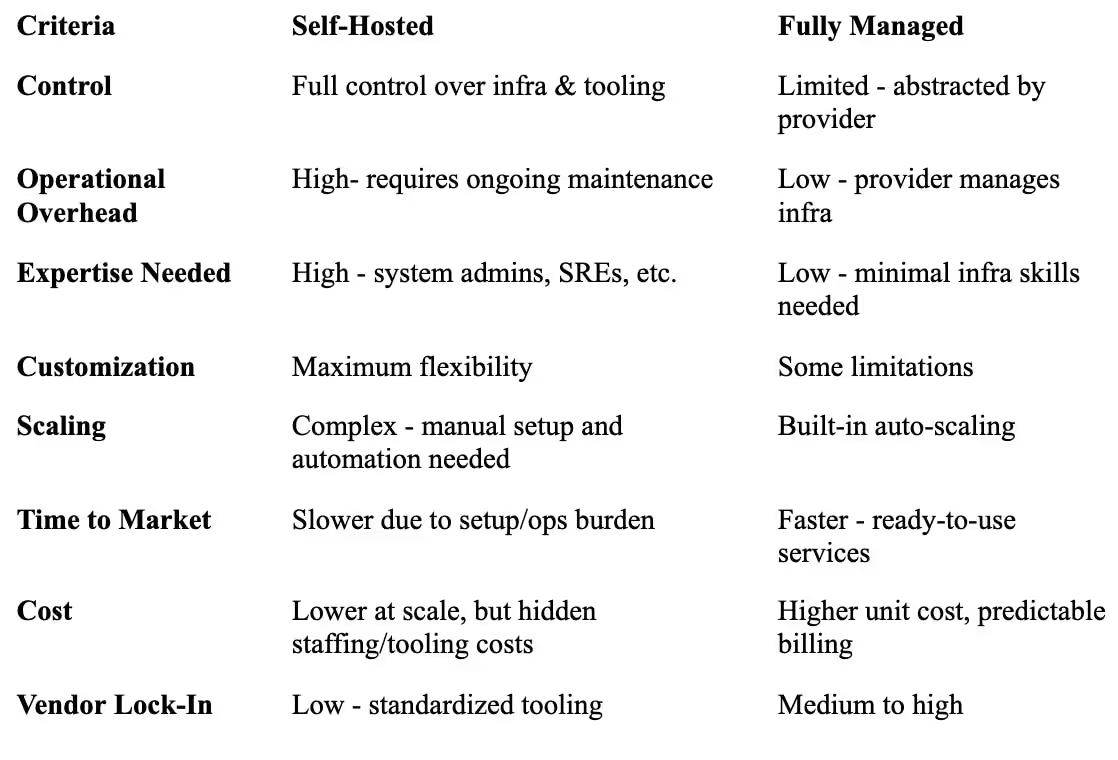
Key Differences between Self-Hosted and Fully Managed Platforms
Understanding the fundamental differences between these approaches helps clarify which options better align with your organization's needs and capabilities.
1. Control and Convenience
The main difference lies in the balance between control and convenience. Self-hosted solutions are built to maximize the control of the underlying infrastructure. Teams decide to invest time and resources into building the ideal infrastructure, tailored to the application being deployed upon it. A managed platform, on the other hand, allows you to outsource this investment, conveniently freeing internal resources for core business development.
2. Team-building philosophy
Self-hosting has a strong implication for internal teams, as it implies the existence of a dedicated operational team to set up, deploy, and manage infrastructure. Fully managed platforms oppose this vision by offloading infrastructure management to a third-party service, allowing internal resources to be allocated to core business activities.
3. Risk
Self-hosting infrastructure exposes operational risks to the internal teams responsible for it. These risks bring investment into extra processes like monitoring, on-call rotation, security updates, and backups. Managed platforms alleviate the need for those efforts, as they cover all bases and reduce the risk exposure for companies using their service.
4. Learning Curve
Self-hosted solutions require in-depth knowledge of various topics and continuous learning across all domains. The skills learned through self-hosting are usually portable to any platform as they involve standard infrastructure practices. Managed platforms reduce the technical expertise required in favor of simpler onboarding and management, which can bring teams to proficiency quicker, even though the knowledge is specific to the chosen platform.
How to Choose: Critical Factors to Consider
1. Technical Expertise
It is critical to assess your team’s current expertise in infrastructure management and define whether this allows for taking on the responsibility of self-hosting applications. Existing team members need to be proficient in system administration, networking, and security. If this expertise is not readily available, the learning curve will significantly impact team productivity.
Choosing to use self-hosted solutions often implies extending existing teams and hiring new engineers. These roles are highly sought after, it is thus important to understand whether your company can attract and retain those talents sustainably.
Self-hosting finally has a requirement on documenting and sharing knowledge about the infrastructure so that it can be maintained and extended upon, even if team members are off. Managed platforms here reduce this risk by centralizing the expertise on the provider side.
2. Budget
Self-hosted solutions appear less expensive on paper, as infrastructure generally costs less than services offered by fully managed solutions. It is essential to calculate the overall costs of managing infrastructure autonomously, which include extra hiring and training costs for responsible teams, tools, and licenses, as well as the cost of resources diverted from other development.
While the investment is higher during initial implementation, self-hosted solutions often provide better economics as infrastructure scales. Managed platforms typically employ predictable and scalable pricing. This predictability is a great asset to draw out financial planning for a company, however, it can be impactful when products scale, as costs stay proportional to deployment sizes.
3. Scaling
When choosing an infrastructure strategy, it is essential to understand the scaling potential of a product and its impact on the underlying infrastructure. Understanding traffic patterns and growth projections for your user base is critical. Managed platforms usually handle unpredictable scaling in better ways compared to self-hosted solutions, which require more time and expert investment to prepare and handle.
It is also crucial to understand the geographical distribution of a service and its possible expansion. If you intend to make services available on multiple continents in the future, complexity will arise due to the challenges of providing global infrastructure and services. Managed platforms often simplify this effort to distribute existing systems in multiple data centers, therefore making global expansion easier than a self-hosted multi-region setup, which requires deep technical investment.
Conclusion
For most mid-size teams, fully managed hosting platforms represent the optimal balance of capability, cost-effectiveness, and resource efficiency. Looking at both solutions from the perspective of a scaling organization, it is clear that reduced operational overhead and team investment highlight the upsides of choosing managed platforms.
While self-hosted solutions offer deep control and customization of infrastructure to fit a product perfectly, they require investment in time and resources to build out and maintain sustainably. For most growing organizations, they represent an investment that diverts resources from core product development and slows down delivery.
Mid-size companies need to stay competitive and iterate quickly on their product to build customer relationships and better market fit. Fully managed platforms eliminate the need to invest and look after infrastructure by providing all the same capabilities at a reasonable cost.
With Qovery, your team skips infrastructure management entirely while retaining the performance, flexibility, and control needed to scale fast. Explore how we support growing teams at Alan, Talkspace or Getsafe with reliable, secure, and developer-friendly deployment workflows. Get started today!

Suggested articles
.webp)



.svg)
.svg)
.svg)
